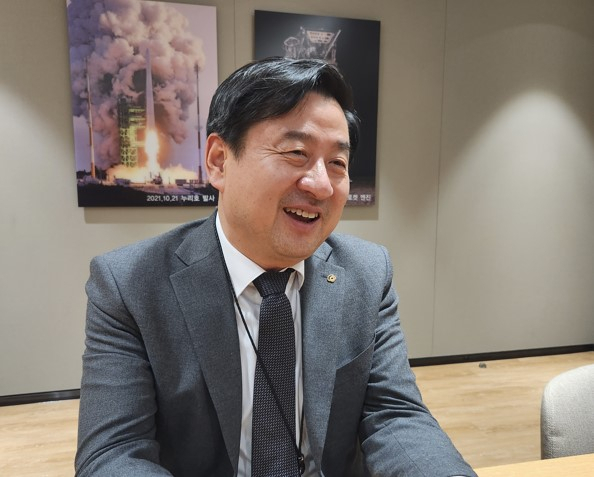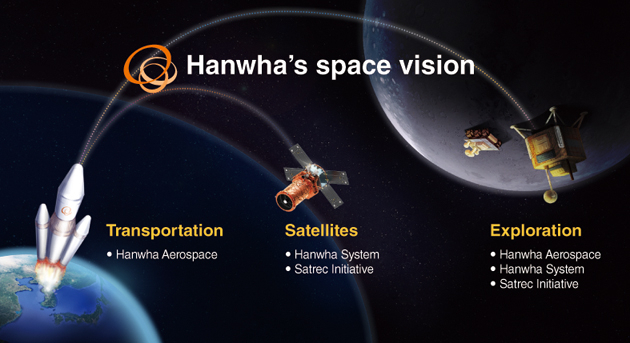
Hanwha Group, South Korea's seventh-largest conglomerate by total value of assets, solidified itself as the leading player in the country’s space race in the private sector when its aerospace arm, Hanwha Aerospace, won the bid to lead the project of upgrading the homegrown Nuri rocket over Korea Aerospace Industries in December 2022.
On top of advancing the Nuri rocket through four more launches by 2027, Hanwha has made it clear that it aims to become what it calls a “total space solution provider” that offers a complete value chain of services with space transportation, satellites and space exploration.
The group, however, is not rushing things as it regards the space sector as a long-term industry that requires a lot of investment in the early phases.
“Everyone knows the space business is not creating profits right now. Our launch vehicles are not generating gains. Rather, we have losses. It’s a business that we have to intensively invest in as we look into the next 10, 20 years,” said Lee Jun-won, senior vice president at Hanwha Aerospace, in an interview with The Korea Herald at the Hanwha headquarters in Seoul last week.
Lee took the example of Hanwha Group’s decadelong investment in its solar energy businesses. Hanwha Solutions, the group’s eco-friendly energy company, jumped into the solar energy sector in 2010. The company has now positioned itself as one of the top solar cell producers in the world, securing the biggest share in the US household solar module market for over a year.
Hanwha Group announced its five-year investment plan worth 37.6 trillion won ($28.4 billion) in May 2022. The conglomerate set aside 20 trillion won for domestic investment with 2.6 trillion won of it being put into the defense and aerospace sectors.
For the remaining 17.6 trillion won of the total investment, which will be used overseas, Hanwha has not specified how the money will be spent. Given Hanwha’s recent trends in its business portfolio, the investment is likely to be used for expanding the solar energy and space sectors.
Hanwha Group’s space ambitions took concrete shape when it set up the Space Hub, a conglomerate-wide council dedicated to developing space businesses, in March 2021. Kim Dong-kwan, the group’s vice chairman and the eldest son of Hanwha Group Chairman Kim Seung-youn, has taken the helm of the Space Hub. Hanwha has acquired or invested in a number of satellite and space communication companies such as Satrec Initiative, Korea’s only satellite company that has export sales, and OneWeb, a UK firm specialized in connecting hundreds of low-Earth orbit satellites.
“We are in the stage of setting up strategies as to what kind of (space) businesses we will do in what manner. In the case of launch vehicles, it’s about making them more economical. (SpaceX’s) reusable rockets were a groundbreaking technology. I think we will have to go about it like that in the future,” said Lee.
Although Hanwha Aerospace currently is focusing on learning from Korea Aerospace Research Institute to successfully conduct the Nuri rocket’s launch slated for early May, the company is also keeping close tabs on taking the government project of developing a next-generational launch vehicle capable of projecting bigger satellites than the Nuri rocket can and sending a lunar lander to the moon in 2032.
The government approved the preliminary feasibility review of the next-generational launch vehicle in November 2022. The government will inject over 2 trillion won into the space project. Unlike the past development process of Korea’s space launch vehicles that were led by KARI, this project will begin with a total systems company taking charge from the beginning to help a private company to secure capacities as a complete space launcher.
“Our biggest goal this year is to win the bid for the next-generational launch vehicle project,” said Lee.
The government has not announced the exact date of when bids will open for the next-generational launch vehicle development project. Hanwha Aerospace is expected to vie with KAI for the project.
Lee, who joined Hanwha in 1994 and has witnessed the conglomerate’s business expansion in the space and aeronautics sector since then, pointed out that he believes the role of Hanwha Aerospace is to commercialize space businesses.
“The government, KARI and we all have to take different roles as we move forward. The government and KARI can develop advanced technologies and we can commercialize them. We think that domestic satellites should use Korean launch vehicles,” he said.
Noting that the country’s demand for satellites, especially in the defense field, is expected to shoot up from 2026, Lee called for the government’s efforts to load the satellites on homegrown launch vehicles. He added the company should find ways to cut costs for launches in order to create the best synergy.






